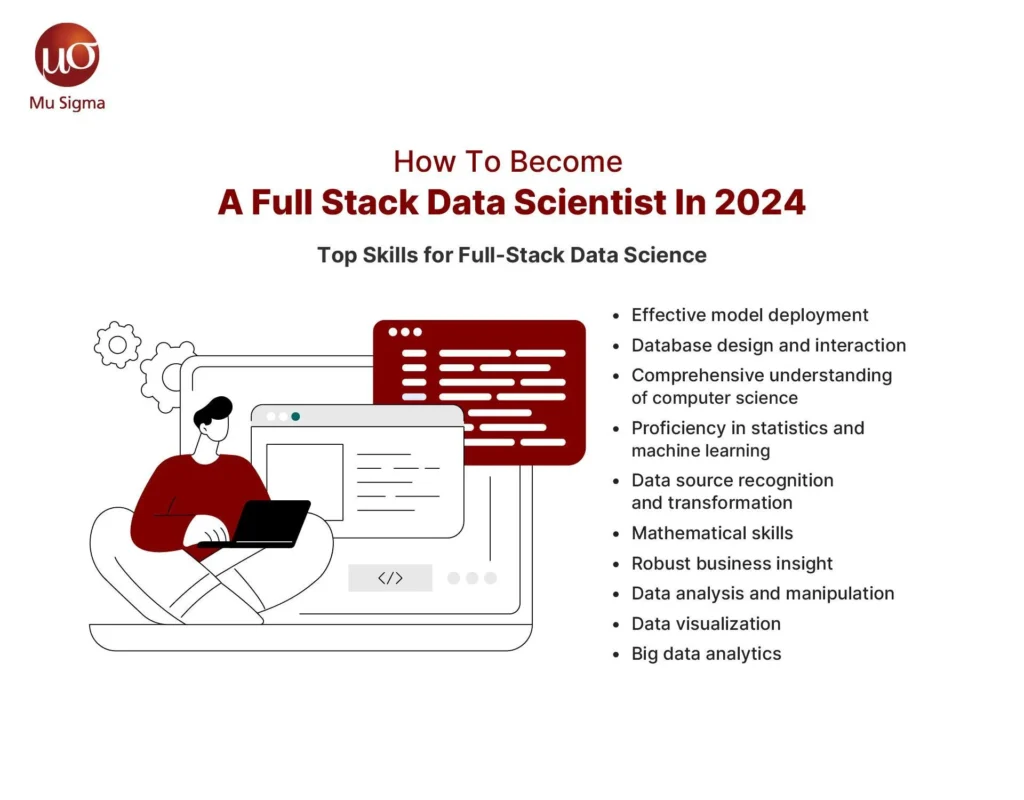Physical Address
304 North Cardinal St.
Dorchester Center, MA 02124
Physical Address
304 North Cardinal St.
Dorchester Center, MA 02124

The Beauro of Labor Statistics shows that jobs for data scientists are expected to grow 35% from 2022 to 2032, much faster than the average for all occupations. Besides, 47.4% of job roles demand a data science degree. Looking at these statistics, it is clear that the future of data science is bright and sunny, and choosing this discipline for your career is a smart move.
However, the availability of jobs is only good news when you possess the skill set. In other words, you must be educated and have experience in data science to secure high-paying jobs. So, how do you become a full-stack data scientist?
This blog addresses this question and provide a comprehensive guide to becoming a full-stack data scientist in 2024. Let’s dive in.
Data science is an interdisciplinary field that focuses on translating data such as customer identity, pain points, preferences, etc., to derive appropriate business decisions. It includes studying artificial intelligence, statistics, scientific methodologies, and data analysis to extract valuable information from data sets.
Data science is crucial for collecting vast amounts of data and filtering it into key insights that offer valuable interpretations to businesses. As a data scientist, your role will be to tackle complex problems utilizing machine learning, AI, and math.
The responsibilities of a data scientist involve finding hidden patterns within data and using these patterns to facilitate data-driven decision-making. So, how do you become a full-stack data scientist?
Becoming a full-stack data scientist is about having the right skills. In the following section, we will discuss all the relevant skills you need to possess to build a successful career in data science.

As a full-stack data scientist, you must know how to deploy models successfully. It is your job to ensure end-users can access the generated valuable insights to make data-driven decisions. Thus, this is a top skill you must master before entering this profession.
Data scientists should be proficient in designing and interacting with databases and datasets. You must also know how to collect, clean, and manipulate data to derive actionable insights. A full-stack data scientist is expected to be skilled in writing queries using programming languages.
A full-stack data scientist should understand data structures, algorithms, and discrete mathematics—skills that are foundational to data science and crucial for developing frameworks and other data science applications.
A strong knowledge of statistics and machine learning is essential for data scientists. As a full-stack data scientist, you need to be capable of applying various machine-learning algorithms to solve complex problems effectively.
To create accurate data frameworks, a data scientist must recognize the right data sources and know how to utilize them to gain valuable insights. You should be able to make the data understandable and deliver it to the appropriate destination.
Mathematical knowledge, including linear algebra and optimization techniques, is vital for full-stack data scientists. These skills help you understand and create machine-learning algorithms. A solid grasp of statistics and probability concepts is also crucial.
Working in data science entails making crucial business decisions, making it paramount to have business insights. Without these skills, you will struggle to identify and address critical issues hindering business growth.
Data manipulation and wrangling are essential for improving data-driven decision-making. These techniques include imputing missing values, treating outliers, correcting data types, scaling, and transforming data. Professionals often use tools like Excel, SQL, and Python to perform these tasks.
One of the most important skills you must have as a full-stack data scientist is understanding data visualization. It includes highlighting patterns and anomalies. Effective visualizations tell a story by focusing on relevant insights and simplifying complex information. They help professionals present data clearly, even without technical expertise.
Big data analytics involves finding trends, patterns, and correlations in large datasets to support data-driven decision-making. This process uses statistical methods like clustering and regression and employs advanced tools to handle extensive data.
Broader Problem-Solving Scope: As you can see, the role of a full-stack data scientist goes beyond data analysis and model training. You have to be a problem solver who can develop complete projects from start to finish, including data wrangling, ELT, data ingestion, and visualization. This comprehensive approach equips you to tackle complex problems effectively.
Continuous Learning and Innovation: In the present work environment, you must keep up with changing needs to sustain and survive. As a developing domain, data science presents the opportunity to stay ahead of the curve by upskilling. With the constant release of new tools and technologies, you’ll have the chance to master new programming languages and tools regularly.
Enhanced Career Opportunities: As a full-stack data scientist, you’ll have plenty of career opportunities. You can specialize in your preferred field while also having the flexibility to work across various domains and industries. Data science is gaining momentum across all sectors globally.
Strong Community and Collaboration: Strong communication skills are crucial for the role of a full-stack data scientist. Thus, you can improve your communication and other soft skills by choosing this career path. It also provides numerous opportunities to connect with a diverse community of data scientists and analysts.
High Demand and Competitive Salaries: This is a simple case of demand and supply. There is a high demand for full-stack data scientists, but the supply is limited. This imbalance ensures numerous job opportunities with competitive salaries for those in the field.
The business landscape is transforming remarkably, with AI and machine learning at its center. As a full-stack data scientist, you need to distinguish yourself by solving business problems and identifying problematic areas, aiding in strategy development, and more. More than anything, this domain needs you to apply yourself.